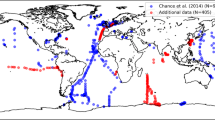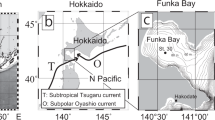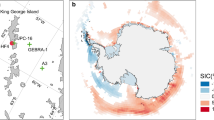Abstract
IN Nature of August 3, 1957, p. 250, T. I. Shaw and L. H. N. Cooper suggested that the oxidized form of iodine in sea water is, in all probability, hypoiodous acid and is not iodate, as we believed1. We were interested in the reasons for their conclusion; but we cannot accept their view.
This is a preview of subscription content, access via your institution
Access options
Subscribe to this journal
Receive 51 print issues and online access
$199.00 per year
only $3.90 per issue
Buy this article
- Purchase on Springer Link
- Instant access to full article PDF
Prices may be subject to local taxes which are calculated during checkout
Similar content being viewed by others
References
(a) Sugawara, K., “Distribution of Some Minor Bio-Elements in Western Pacific Waters”, Proc. Regional Symp. Physical Oceanography, Tokyo, 1955 (published by Unesco, 1957). (b) Sugawara, K., and Terada, K., J. Earth Sci., Nagoya Univ., 5, 81 (1957).
Sugawara, K., Koyama, T., and Terada, K., Bull. Chem. Soc. Japan, 28, 494 (1955).
Li, C. H., and White, C. F., J. Amer. Chem. Soc., 65, 335 (1943).
Author information
Authors and Affiliations
Rights and permissions
About this article
Cite this article
SUGAWARA, K., TERADA, K. Oxidized Iodine in Sea Water. Nature 182, 250–251 (1958). https://doi.org/10.1038/182250a0
Issue Date:
DOI: https://doi.org/10.1038/182250a0
This article is cited by
-
Molecular iodine reduction by natural and model organic substances in seawater
Aquatic Geochemistry (1995)
-
Microchemical determination of lodate and iodide in sea waters by flow injection analysis
Mikrochimica Acta (1993)
-
Speciation of dissolved iodine in estuarine waters
Nature (1979)
-
Determination of iodate in rain-water
Journal of Radioanalytical Chemistry (1978)
-
Studies on marine trace elements and preparation of CSK standard solutions
Journal of the Oceanographical Society of Japan (1974)
Comments
By submitting a comment you agree to abide by our Terms and Community Guidelines. If you find something abusive or that does not comply with our terms or guidelines please flag it as inappropriate.



